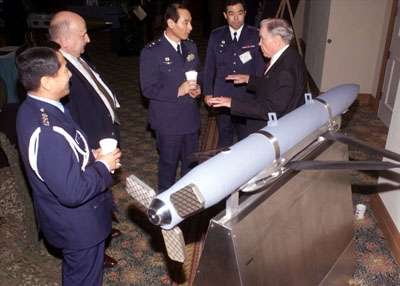Sat, Oct 08, 2005
Strange Bedfellows?
 Boeing and Lockheed Martin have
signed an exclusive teaming agreement to compete for the Small
Diameter Bomb (SDB) Increment II Program.
Boeing and Lockheed Martin have
signed an exclusive teaming agreement to compete for the Small
Diameter Bomb (SDB) Increment II Program.
Under the agreement, Boeing is the prime contractor supplying
the air vehicle and data link, and Lockheed Martin is the principal
supplier, providing the multi-mode seeker that's needed to meet the
US Air Force and US Navy requirement of hitting moving targets.
 "This agreement forms the best team
possible to provide the SDB Increment II capability," says Mark
McGraw, Boeing Weapons Enterprise Capability Center vice president.
"It combines Lockheed Martin's multi-mode seeker technology, with
Boeing's extremely successful and capable SDB system, to provide a
best-value, all-weather moving target solution and a formidable
weapon for the US military."
"This agreement forms the best team
possible to provide the SDB Increment II capability," says Mark
McGraw, Boeing Weapons Enterprise Capability Center vice president.
"It combines Lockheed Martin's multi-mode seeker technology, with
Boeing's extremely successful and capable SDB system, to provide a
best-value, all-weather moving target solution and a formidable
weapon for the US military."
As the prime contractor, Boeing will have responsibility for the
overall weapon system. Lockheed Martin has total sub-system
responsibility for the seeker system.

"Our teaming agreement with Boeing ensures the warfighter will
receive the best possible weapon system," said Randy Bigum, vice
president of Strike Weapons at Lockheed Martin Missiles and Fire
Control. "We will enhance the capability of Boeing's proven SDB I
system with the addition of our advanced multi-mode seeker. The
combination creates a new system that provides the Air Force and
Navy with a capability that has been needed for some time - the
ability to strike moving targets from standoff range."
Lockheed Martin's multi-mode seeker enables all-weather attack
and classification of moving targets, a critical requirement of SDB
II. Extensive work and testing have been done on the seeker in the
Joint Common Missile and Surveilling Miniature Attack Cruise
Missile (SMACM) programs, making it a low-risk approach. The
precision provided by the seeker will enable aircrews to attack
more targets with fewer sorties.

The US Air Force is expected to issue its formal SDB Increment
II Request for Proposal in late October. In the meantime, Boeing
and Lockheed will continue work on their proposal and continue
putting together the best team possible to win the SDB Increment II
competition. The risk reduction contract award to begin the
competition is expected next spring.
More News
Aviation Governance Secured...At Least For a While The National Business Aviation Association similarly applauded the passage of the FAA's recent reauthorization, contentedly recou>[...]
Emphasis On Growing The Future of Aviation Through Concentration on 'AFFORDABLE FLYERS' It's been a number of years since the Latest Edition of Jim Campbell's HUGE SportPlane Resou>[...]
Amazilia Aerospace GmbH, Develops Digital Flight Control, Flight Guidance And Vehicle Management Systems Textron eAviation has acquired substantially all the assets of Amazilia Aer>[...]
Honeywell's Primus Brings New Tools and Niceties for Hawker Operators Hawker 4000 business jet operators have a new installation on the table, now that the FAA has granted an STC f>[...]
Company Celebrates Niche-but-Important Advancement in Industry Standards Echodyne has announced full integration of its proprietary 'EchoFlight' radar into the e American Aerospace>[...]
 Bolen Gives Congress a Rare Thumbs-Up
Bolen Gives Congress a Rare Thumbs-Up The SportPlane Resource Guide RETURNS!!!!
The SportPlane Resource Guide RETURNS!!!! Buying Sprees Continue: Textron eAviation Takes On Amazilia Aerospace
Buying Sprees Continue: Textron eAviation Takes On Amazilia Aerospace Hawker 4000 Bizjets Gain Nav System, Data Link STC
Hawker 4000 Bizjets Gain Nav System, Data Link STC Echodyne Gets BVLOS Waiver for AiRanger Aircraft
Echodyne Gets BVLOS Waiver for AiRanger Aircraft






